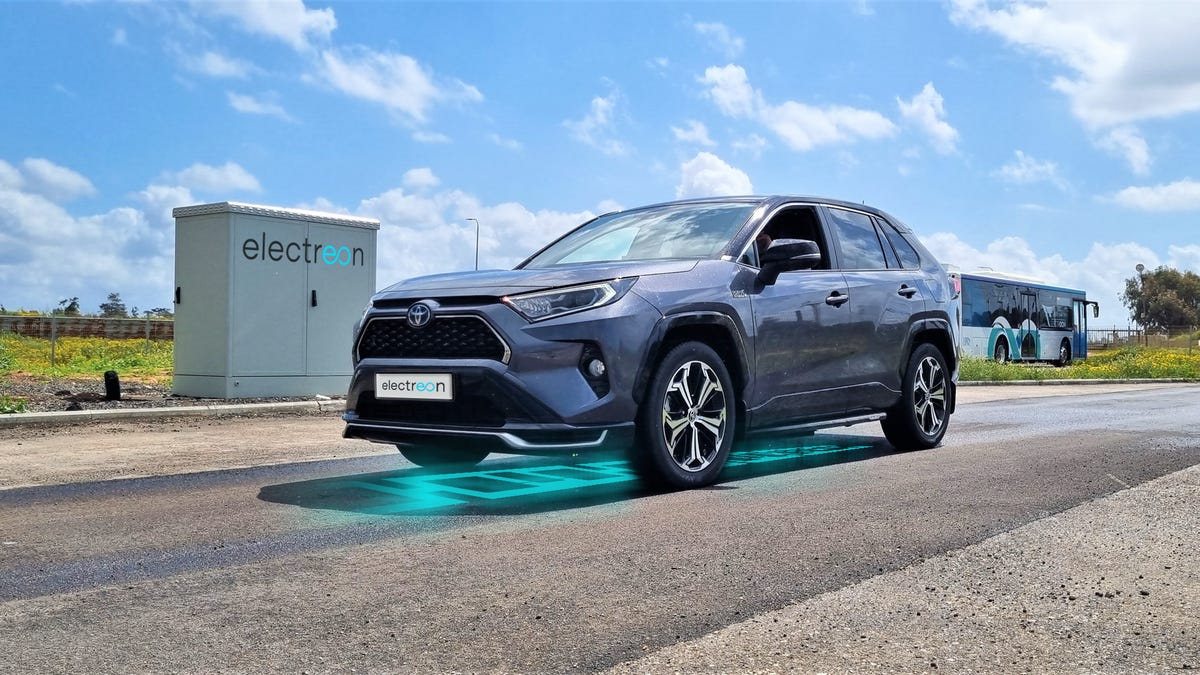
Electric cars have one major drawback: Who wants to stop to charge up while on a long road trip? This week, a Toyota RAV4 Prime managed to go more than 1,200 miles in electric mode without stopping to recharge, announced Electreon, an electric-roadway startup. But it wasn’t due to the hybrid SUV itself — it was due to the road.
The record was set on the company’s 200-meter demo track, which features a wireless charger installed underneath the asphalt in 25% of the road. The company says the platform provides “endless range” for any EV, and supports multiple users, from small cars to large trucks.
The ride took 56 drivers, one of whom was Israeli racing driver Bar Baruch. The result set a world record for the longest time and distance ever driven by a passenger EV. The Toyota RAV4 Prime is a plug-in hybrid model, not a full EV, but the gas engine never kicked in during the 1,200-mile drive, since the SUV’s battery stayed charged.
According to the US Department of Energy, the average all-electric vehicle gets between 100 and 400 miles on a single charge, and plug-in hybrid vehicles can typically go 15 to 50 mph on battery power alone before the engine kicks in. The RAV4 Prime has an EPA-estimated electric-only range of 42 miles, according to Toyota.
Read more: Every EV Available in 2023, Ranked by Range
“This milestone proves that Electreon’s wireless charging technology effectively addresses two key challenges in EV transition: range anxiety and battery size,” the company said. “It eliminates range anxiety, enabling an endless drive, and demonstrates that even a compact 18kWh battery size is no longer a limiting factor in EV adoption.”
The vehicle only paused momentarily to switch drivers, never switching off its engine, and never for dedicated charging. Its 18kWh battery was never depleted, and was continually charged by the electric road.
“By eliminating the necessity for large batteries, (the technology) not only reduces the total cost of EV ownership and environmental impacts but also offers the unparalleled advantage of extended, if not unlimited, range,” the company said.
Electreon didn’t immediately respond to a request for comment about how fast the vehicle could travel while continuing to charge. A 100-hour drive covering 1,200 miles would average just 12 mph; however, Oren Ezer, Electreon CEO and co-founder, told Insider that the car circled the track at around 30 mph.
The company has created a 1,900-foot prototype road in its home country of Israel, with projects in development in Sweden, Italy and Germany, Jalopnik reports.
This could be a sign of what’s coming for EVs in the future besides the nationwide network of EV charging stations that’s on its way. Electreon plans to install its technology in a mile-long stretch of road in Detroit this summer, in a partnership with the Michigan Department of Transportation. A similar project is planned for Utah, where the company has already successfully installed a 164-foot-long test track.
If you’re looking to switch to a cleaner, greener car and save money at the pump, here are CNET’s picks for the best electric cars of 2023 and the best hybrid cars.
